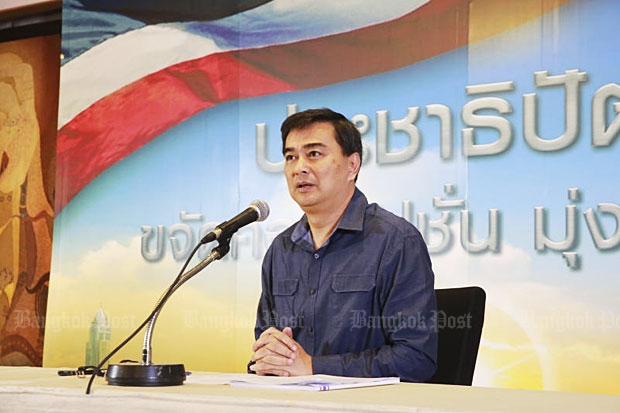
Democrat Party leader Abhisit Vejjajiva says he will not accept the draft constitution, revealing for the first time his personal stand on the issue.
Speaking at the party headquarters in Bangkok on Wednesday, Mr Abhisit said this was his own standpoint, not a party resolution, because of the junta’s ban on party meetings. However, he said his position was aligned with the party’s ideology.
Mr Abhisit said he could not accept the new draft constitution because it did not solve the country's existing problems involving national development, corruption and political conflicts.
“The three points are my reasons for not accepting this draft charter. I want to stress that it's not because of the election system or a political party issue [in the draft],” the former prime minister said.
“But I will not accept it because it does not solve the country’s problems nor offer permanent rules to help Thailand to move away from its current condition.”
The draft was not flexible enough to tackle economic problems and had loopholes in solving graft because it left the door open for corrupt politicians to appeal. It also lacks democratic principles, especially one concerning the appointed Senate in the draft charter's provisional clauses.
The Democrat leader warned that the 250 senators handpicked by the military junta to serve a five-year term during the transition period to full democracy would not only fail to solve political conflicts, but would create new ones because no one could fully say they represent the people.
On corruption, the new charter rescinded current processes to impeach political office-holders and opted to rely mainly on two agencies -- the National Anti-Corruption Commission and the Supreme Court's Criminal Division for Political Office Holders.
Mr Abhisit said this was a problem because the new law requires an impeachment petition being lodged with the speaker of the House of Representatives. This would open an opportunity for the ruling government and the graft-busting agency to negotiate.
The current law would not allow politicians to appeal against the ruling of the Supreme Court's Criminal Division for Political Office Holders unless they had new evidence. Their appeals would be considered by a panel of Supreme Court judges.
But the draft made the appeals easier by giving the authority to a new panel to screen the pleas instead.
Mr Abhisit said the defendants in the rice-pledging case would be the first group to benefit from this change if the new charter passes the Aug 7 referendum.



